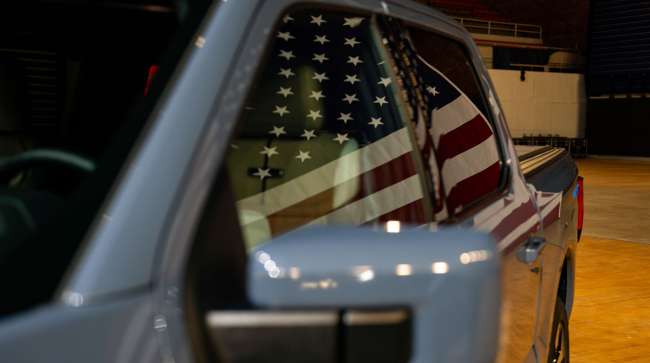GM and Ford Lobby to Save EV Tax Incentives

[Stay on top of transportation news: Get TTNews in your inbox.]
Automakers are lobbying against Washington lawmakers ending popular electric-vehicle tax credits that President Donald Trump has railed against, pushing instead for a gradual phase-out over several years.
General Motors Co. and Ford Motor Co. are among the carmakers and industry lobbying groups making pilgrimages to the Hill to ask the Trump administration and Republican legislators to preserve some EV incentives in the Inflation Reduction Act passed under Joe Biden, according to people familiar with the effort who weren’t authorized to speak publicly on the matter.
Among the options being floated if the Trump administration moves to strike EV incentives is a three-year wind down to allow more time for the companies to adjust their businesses, these people said.
It’s not immediately clear if Trump is receptive to the idea, or whether automakers can find enough votes among Republicans in Congress to keep EV incentives in place. But the industry is making the case that thousands of jobs now rely on electric vehicles, and that a disproportionate number of EV and battery plants are in Republican states like Ohio, South Carolina, Georgia and Alabama that make up what’s now sometimes referred to as the U.S. “Battery Belt.”
Another element of the carmakers’ pitch: A yearslong phase-out period would give automakers time to drive battery and EV costs down so they can reduce prices and sell electric vehicles without help from the federal government. They say the support also helps give domestic automakers a chance to build out an American-made supply chain to better compete with China.
RELATED: Ford CEO Says Tariffs Would ‘Blow a Hole’ in Auto Industry
“We have the potential repeal of various IRA elements,” Ford CEO Jim Farley said Feb. 11 at an investor conference in New York. “We’ve already sunk capital. And many of those jobs will be at risk if the IRA is repealed, big parts of it is repealed.”
Farley said he’ll meet with members of Congress this week, which he said will be his second trip to Washington in three weeks.
GM CEO Mary Barra recently met with Trump to discuss tariffs and other administrative policies that affect the auto industry. The company has pushed to apply the same sourcing standards to incentives toward leasing EVs that are currently applied to purchases, so that battery materials and production would have to be in the U.S. or come from certain trading partners, one of the people said. If GM gets its way, Asian and European automakers would have a tougher time leasing EVs.
Host Seth Clevenger and TT's Connor Wolf discuss CES 2025 and the emerging technologies that could push the trucking industry forward. Tune in above or by going to RoadSigns.ttnews.com.
Many automakers are asking to preserve as much of the IRA incentives as they can, including the so-called leasing loophole that allows any vehicle to get all $7,500 of the incentive regardless of where the battery materials come from or what the lessee’s annual income is.
The automakers’ campaigning for credits contrasts with Tesla Inc. CEO Elon Musk’s calls for EV subsidies to be eliminated. In the years since he’s said the federal incentives should be scrapped, Tesla cut prices of vehicles including the Model X to qualify for them. The company also promotes the tax-credit eligibility of various models on its order pages.
Any cuts or repeal of EV credits under IRA would likely come in a reconciliation bill where Republicans will have to weigh the benefits of falling in line with Trump’s priorities against potential drawbacks for high-paying jobs in their states. Data from the electric-vehicle advocacy group American EV Jobs Alliance shows $167 billion has been invested to create 200,000 EV-related manufacturing jobs in 12 states.
The GOP represents congressional districts with 19 of 25 major automaker battery and EV assembly plants in operation or under construction. Most of the remaining facilities in Democratic Party-represented districts are in states that supported Trump in the November election.
David Welch, Keith Laing and Gabrielle Coppola contributed to this report.
Want more news? Listen to today's daily briefing below or go here for more info:





